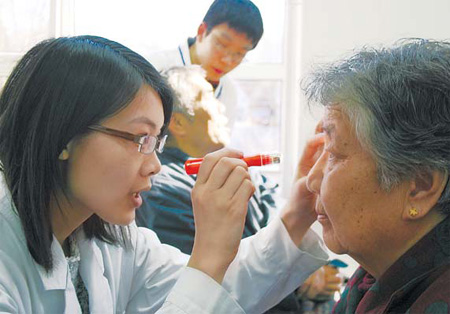

The passenger beside you on the bus suddenly disappears from your field of vision, or the pen laid down on the left slips out of sight. Such visual disturbances could be symptoms of glaucoma. The disease results in damage to nerve cells in the retina and the optic nerve.
However, when symptoms occur it is often too late. Glaucoma is one of the leading causes of blindness.
Intraocular pressure - the pressure of fluid in the eye - was long thought to cause glaucoma.
"Now we know that is only one risk factor, albeit a significant one," says Ronald Gerste, ophthalmologist and secretary general of the Initiative for Early Detection of Glaucoma in Germany.
Another common cause of the deterioration of cells is deficient or fluctuating blood flow.
"Very often increased intraocular pressure and low or fluctuating blood pressure occur simultaneously."
Aqueous fluid is constantly produced inside the eyeball to nourish the cornea and maintain its shape. In a healthy eye, there is a balance in the production and flow of this fluid.
The flow can however be reduced or obstructed because of injury, the drainage channel being blocked or closed, a congenital abnormality or diabetes. The result is an increase in pressure on the optic nerve that crushes the delicate cells.
The eye can compensate for this damage for a long time, without impaired function.
"By the time a patient notices their vision has changed somewhat, 30 to 40 percent of nerve cells have already been destroyed," says Helga Kipp of Germany's Glaucoma Self-Help Association.
"At this stage central vision is already affected, irreparable damage has been done and therapeutic intervention can preserve only that which is still intact."
The primary treatment for glaucoma involves the use of eye drops.
"In the past patients used to complain of burning of the eyes," according to Georg Eckert of the German Ophthalmological Association. "The eye drops dilate the pupils and patients subjectively experience a deterioration of vision."
Preparations available these days however have far fewer unpleasant side effects. Nevertheless, the therapy is an everyday nuisance. "One has to take the drops along everywhere. Some patients experience side effects such as pain, a cough or a build-up of mucous," says Kipp.
Older people and those with arthritis find it difficult to administer the drops. For these reasons some patients neglect treatment, especially in the early stages of the disease when the visual impairment is minimal or not yet perceivable.
"This is a serious mistake," Eckert warns. The progression of glaucoma can be prevented only if it is treated continuously and monitored regularly.
Another treatment possibility, surgery, is the norm in about 10 to 20 percent of all cases. The benefit: "A single intervention can alleviate more pressure in the eye than eye drops can," according to Gerste. Moreover, the patient's quality of life is not affected.
The patient should weigh up the risks and benefits of treatment in consultation with a doctor. "In addition, a second opinion, from an eye clinic for example, is essential," says Kipp.
Experts recommend early screening as of age 40 at least, since available therapy can only really maintain the existing visual ability once the disease is detected.
During screening, intraocular pressure and visual field is measured, the optic nerve is examined to determine if any changes have occurred, for instance around its edges, and an X-ray of the optic nerve head may be obtained.
In addition to personal risk factors, such as low or fluctuating blood pressure, cardiovascular disease, low corneal thickness or diabetes, family history must also be determined.